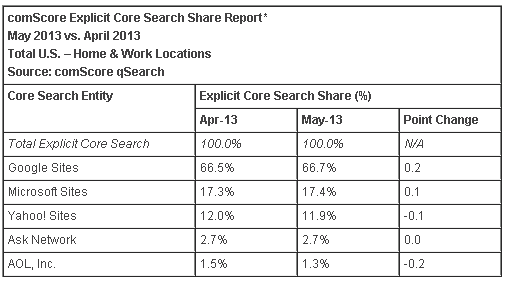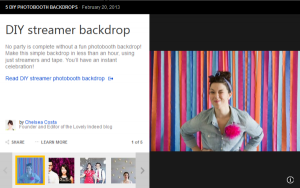Internet Marketing News June Recap
July 1, 2013July 1st, summer is officially in full swing! Another month, another quarter, and time for the next installment of Internet marketing news updates!
June was a great month with a lot of changes all nicely categorized below. One of the largest stories that affected all of the industry players was the leak around NSA’s PRISM operation. The US National Security Agency (NSA) has been named in a massive surveillance operation utilizing data from some of these key players including Google, Facebook, Microsoft, Yahoo, Apple, AOL, and Skype. Each company has released statements denying providing the government direct access to their databases, however, it will be interesting to see how the general public reacts to these developments.
Another industry development is the FTC’s updated guidelines to search engines. In the end of June, the Federal Trade Commission sent a letter to 20 general and specialty search engines with changes to its 2002 landmark guidelines. The FTC guidelines are designed to help clarify the split between paid and organic listings when a user searches for something. The update includes the need for additional visual cue such as labels, borders, and shading. An interesting development is that the letter was sent to all search engines, including Facebook Graph Search. It also includes audio disclosers for voice search applications like Siri.
Before we dig deeper into individual news stories, let’s review May’s Share of Search report by Comscore to finish off May Internet Marketing News Recap. Overall Bing and Google are the winners, each increasing their share of search slightly at the expense of Yahoo! and AOL. Below is the month over month percent change of search share by ComScore:
So with that, let’s get started!
- Google announced the official beta for Image Extensions in AdWords. Since it’s a beta, Google will probably test out different formats but currently it is three relevant images like the one below:
- Google AdWords also rolled out dynamic retargeting for the retail industry through Google Merchants. If enabled, Google will chose images based on a user’s past browsing history on that site. Brands can however control whether to retarget all visitors, specific product visitors, those who abandon a shopping cart, and past buyers.
- AdWords advertisers using enhanced campaigns can now customize site link details. Google has found that click-through-rates on ads with site links are higher than those without links, due to the extra details are provided to searchers. So allowing advertisers to choose which details are shown can only help CTRs.
- Google has updated their Data Highlighter to extend to 8 different types of structured data. Originally launched to only include events, webmasters can now tag products, local businesses, articles, software applications, movies, restaurants, and TV episodes to enhance the way this content appears in search engine results, without the need to know how to write code for your site. Google also launched a Structured Data Markup Helper for advanced webmasters to embed this data directly onto the website.
- Google also officially launched the knowledge graph carousel for local search. Users who search things like local restaurant or bars will see a horizontal carousel of images above the SERP.
- Google is buying Waze, a map and navigation app, for around $1.3 billion. Still pending FTC approval, this opens up more opportunities for local advertising, social maps, and the data from the 50 million current users.
Bing
- Bing now allows advertisers to export Bing Ad Reports directly into Microsoft Excel. These outputted reports come preformatted with filters making it easy to sort as well as create pivot tables and charts. Although this is a relatively minor enhancement, this feature will improve users’ workflow.
- Bing also announced a couple new features coming to Bing Ads location extensions, which launched last year. Advertisers can now upload up to 100,000 locations at the account level and select locations to display for campaigns. The extension will serve up to 3 addresses as well as a new “directions” link next to each one. An associated detailed report on the back end will allow the advertiser to see visibility, spend, and click data for the direction link at the location level.
- Bing launched a creative advertising campaign aimed to attract more users to Bing Search. Now at 13 different US airports, users can access free Wi-Fi at premium connection speeds, courtesy of Bing, by simply taking the “Bing It On Challenge.”
- Bing is also trying to persuade schools to use Bing as the default search engines with its newest program, Bing for Schools. This allows K-12 schools to remove all advertising from SEPRs, filter out adult content, default SafeSearch, and additional content to enhance digital literacy skills.
- In a similar play to attract new users, Apple announced that Siri on the new iOS7 will allow users to search with Bing, not just Google. This doesn’t mean Bing is the default search engine for Siri though; Siri will utilize Google and Bing as well as Twitter and Wikipedia to serve the best answer.
- Bing is also adding new social elements to their results page with the new “Bing Boards.” Bing Boards are collections of images, videos and links around a specific topic created by small group of food and lifestyle blogger. Below is an example when a user searches “photo booth backdrop”.
Yahoo!
- Yahoo announced a new product, Localworks, which will help small business with local listing management. This launch, in conjunction with the locations software company Yext, should help small businesses update listings across more than 40 online platforms which reaches 150 million local search’s, according to Tom Byun, VP, Yahoo Small Business.
- Yahoo continued to shut down some of its search products including AltaVista and Axis along with ten other products.
- Yahoo is rolling out Search Alerts for Web Search, Images, and Videos, similarly to the way users can receive alerts for News, Fantasy Sports, Horoscopes, Stocks, and Weather.
- Yahoo redesigned their search results page – which now boasts a faster load time, more room for results, and a new navigational bar that is consistent with the Yahoo homepage. Below is an video created by Search Engine Land.
- In an effort to simplify and streamline its ad products, Facebook discontinued Sponsored Search Ads; citing that the majority of units sold went to mobile apps and games which can utilize different ad options like mobile app install ads and Page post links on desktops to achieve the same goals. Facebook did say, however, that search ads will make a comeback through Graph Search after they fully work out the details.
- Facebook also announced that it now has one million businesses actively advertising on the social network. According to Dan Levy, Facebook’s Director of Small Businesses, the vast majority of these advertisers are small businesses.
- As rumored earlier this year, Facebook rolled out hashtags with similar functionality as Twitter. Users can search for a hashtag in the search bar, click on it through other services such as Instagram, and post directly to the hashtag feed. While there is no associated advertising announced- it is safe to assume this is currently being planned.
- Instagram, recently purchased by Facebook, announced this month the ability to share 15 second videos via their mobile app with basic editing features; directly competing with Twitter’s Vine App. Since the launch of Instagram videos, studies such as this one by Topsy, have shown a dramatic decrease in Vine videos shared on Twitter.
- Twitter rolled out analytics for all of its users by going to ads.twitter.com. While currently pretty basic, users can view information on favorites, retweets and reply interactions.
- Twitter purchased local discovery app Spindle which will increase Twitter’s local business targeting. Spindle describes itself as a “news feed for your neighborhood”- collecting both local tweets and Facebook posts based on your location, and providing a stream of local events and offers. While the long-term advertising value for Twitter is unknown, we can safely assume this will allow for more highly targeted advertisements based on location.
- Pinterest announced a useful search feature which allows users to narrow search results to only their own pins. This allows users to rediscover past pins that they might have forgotten about.
What’s New at Catalyst
- Dan Cristo, Director of SEO Innovation published Television Is About To Change In A Big Way, Thanks To Search on Search Engine Journal.
- Organic Search Manager, Rivka Fogel, is featured on the Conductor Blog with the article New Quality and Trust Signals in the Post-Penguin Age.
- And Ben Spiegel, Director of Organic Search, was published in Search Engine land’s Use Site Search Data To Fuel Your Content & Key Phrase Strategy and ClickZ’s YouTube Paid Advertising – a Beginner’s Guide.
- For more frequent updates on Catalyst news, industry events, and featured articles check out our new company news page.
- Sign Up for the Catalyst Must-Have Digital Insights e-Newsletter for the latest thought leadership, industry updates, and Catalyst news.
- Catalyst is Hiring! We have open positions in each of our offices; check out our Careers Page for the latest open positions.
Have any questions about any of the above stories or think we missed something? Let us know in the comment section below. Also, be sure to check back in early August for our July monthly recap!








